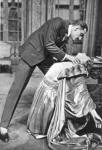Fedora
A play in four acts by Victorien Sardou. Opened at the Globe Theatre, London, October 30, 1920. Closed on February 5, 1921, after 111 performances. General Manager, Henry Dana; Stage Manager, E. Vivian Reynolds; Assistant Stage Manager, E.A. Walker.
Cast of characters
| Count Loris Ipanoff | Basil Rathbone |
| Pierre Boroff | William Stack |
| Gretch | Henry Vibart |
| Tchileff | A. Carlaw Grand |
| Dmitri | Patrick Kay |
| Boris | Charles Bishop |
| Basil | Rex Caldwell |
| Jean de Siriex | E. Allan Aynesworth |
| Dr. Loreck | Alfred Gray |
| Boleslav Lasinski | Linden Lang |
| Desiré | E. Vivian Reynolds |
| Kirill | Drolincourt Odlum |
| Ivan | E.A. Walker |
| Princess Fedora Romanova | Marie Lohr |
| Countess Olga Soukareva | Ellis Jeffreys |
| Marka | Molly Balvaird-Hewett |
| Act I | St. Petersburg |
| Act II | Paris, apartments of Countess Olga Soukareva |
| Act III | Paris, Salon in Fedora's apartments |
| Act IV | Paris, Salon in Fedora's house looking out on the wharf |
Written in 1881, "Fedora" is a famous Russian tragedy about a woman avenging her lover’s death. Sardou's grim story tells how Fedora's secret fiancé was killed, and how she set out to ruin the suspected assassin, Count Loris Ipanoff. She meets him in Paris, makes him love her, and extracts the truth, only to learn that her fiancé had been false to her. Meantime, however, her vengeance had wreaked itself on the Count's brother.
Fedora Romanova, a widowed princess in St. Petersburg, is on the point of contracting a new marriage; she has been secretly engaged to Count Vladimir Yariskin, the son of the police chief.
On the evening with which the play opens, the princess has been vainly expecting her fiancé. In great uneasiness she hastens to his quarters, but his servants can give her no information. At last he is found mortally wounded. All circumstances indicate that he was the victim of nihilistic revenge, a surmise which to Fedora's mind becomes a certainty. Count Loris Ipanoff is known to be the perpetrator of the deed. He has fled to Paris and, as the French government does not permit the extradition of political criminals, Fedora must take revenge into her own hands.
Act II takes place in Paris. Fedora gains admission to the salons of Countess Olga Soukareva, whose house is a resort for political refugees and other persons whose life is tinged with the romantic. In this circle she becomes acquainted with Loris Ipanoff, the murderer of her fiancé. But since she has come to know him personally, she begins to doubt his guilt. She is bent on bringing him to confess the deed. He admits killing Vladimir, but calls it "the execution of a sentence." He declines to explain further, having no knowledge that Fedora is the murdered man's fiancé. Ipanoff has in fact made to her an avowal of his love. In her inmost heart Fedora reciprocates his feeling, but the passion of revenge being uppermost, she stifles her love. She believes that his statement about the murder being "the execution of a sentence" means that it was committed by order of the nihilists. Accordingly she invites Ipanoff for the night to her villa on the Seine river, where it is her intention to have him secured and taken in her yacht to Havre and thence to St. Petersburg to be given up to the father of the murdered man.
Unrelenting in her thirst for revenge Fedora writes a letter to the St. Petersburg police that names two persons who are supposed to have been accessories to the count's crime. One of them is Loris' brother Valerien. Hardly has she dispatched this fateful letter when Count Loris appears. He now explains to her that his deed was not politically motivated. Ipanoff was married and discovered that Vladimir was having an affair with his wife. He caught them together and shot Vladimir. The guilty wife escaped, without taking her heavy fur cloak. She was taken ill with pneumonia caused by exposure and died within a week. Fedora now realizes that Ipanoff saved her from marrying a worthless, dishonorable man. She also realizes that she loves him as passionately as he does her. To prevent him being captured and taken to Russia, she insists that he stay with her.
A few days pass in the delirium of love and then fate overtakes them. Fedora's denunciatory letter to St. Petersburg has fulfilled its mission; Loris' brother was arrested and died in prison. Their heartbroken mother has also died. Filled with remorse, Fedora confesses to Ipanoff her part in the deaths of his mother and brother. There is no pardon for her deed; he disavows her. Fedora then drinks poison, and dies in Ipanoff's arms.
 Marie Lohr and Basil Rathbone |
 Marie Lohr and Basil Rathbone |
Several film versions of the play were made in the 1910s and 1920s, including Paramount's version made in 1918. The final scene in which the Princess Fedora commits suicide by taking poison was been altered to the conventional "clinch"--Count Ipanoff returning in time to prevent Fedora from swallowing the poison and taking her in his arms in full forgiveness.
An operatic version of the play was written by Umberto Giordano in 1898.
The hat known as a fedora got its name from this play. Sarah Bernhardt starred in the premiere of Sardou's Fedora in 1881. She made her entrance wearing a new style of soft felt hat with the crown creased lengthwise. It became an instant fashion and was known forever after as a fedora.






